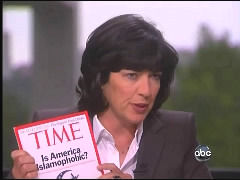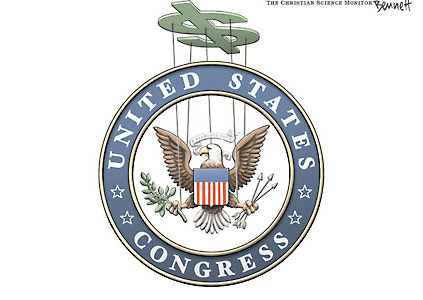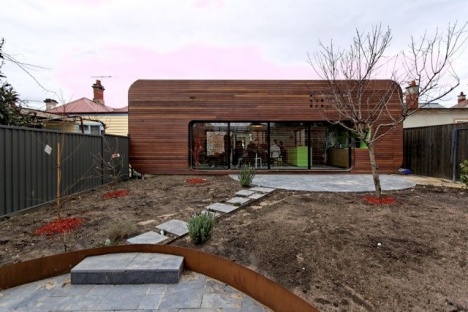Not even feigning the pretense of balance, a week after her roundtable hailed President Obama’s initial endorsement of the Ground Zero mosque (GZM), on this Sunday’s This Week host Christiane Amanpour featured an “exclusive” with two GZM proponents as she declared “the controversy has raised profound questions about religious tolerance and prejudice in the United States. And the backlash against Islam has been seen across the country…” Holding up the current Time magazine with its “Is America Islamophobic?” cover, she forwarded the contention: “Is America Islamophobic? Are you concerned about the long-term relationship between American Muslims and the rest of society here?” Amanpour’s guests, to “cut through the heated rhetoric” on the only Sunday interview show with a guest segment on the GZM (Fox News Sunday took it up in its panel time): Daisy Khan, wife of imam behind the project, and Rabbi Joy Levitt, from the Jewish Community Center in Manhattan, “who’s an adviser on the project.” Amanpour began by undermining the idea the community center with a prayer room inside is all that close to Ground Zero: “Opponents say that it’s just too close to the site of the 9/11 attacks, though it cannot be seen from there. It took an ABC News producer two minutes and 45 seconds to walk from Ground Zero to the site of the proposed center.” Amanpour posed a series of fairly friendly questions about their reaction to the backlash, what services would be provided by the center, if they had made any “missteps” and if they would take up Governor Paterson on his offer to find another location, before she cued them up to denounce Newt Gingrich: There’s been a lot of heated rhetoric as we’ve been saying. I want to play you something that the former House Speaker, Newt Gingrich, said about the plans to build this center near Ground Zero….Let me ask you directly because he did bring up Nazi imagery there. What do you make of that? She raised the funding , but only to portray Khan as an innocent: “Are you prepared to discuss the issue of foreign funding? Let’s say there was foreign funding, how would you be able to know exactly where that money was coming from?” Amanpour did play a soundbite of Khan’s husband claiming in 2001 that “the United States policies were an accessory to the crime that happened.” But after Khan answered he just meant it was “blowback” for “CIA support specifically to Osama bin Laden and the Taliban,” Amanpor dropped the subject so she could move to American prejudice and hate, cuing up Khan: This Time magazine cover is being talked about a lot right now. Basically, “Is America Islamophobic?” Is America Islamophobic? Are you concerned about the long-term relationship between American Muslims and the rest of society here? Khan’s reply likely echoed Amanpour’s unsaid view: “Yes, I think we are deeply concerned because this is like a metastasized anti-Semitism. That’s what we feel right now. It’s not even Islamophobia, it’s beyond Islamophobia. It’s hate of Muslims.” During the subsequent roundtable, Robert Reich made clear his disgust with the “intolerance” of Americans on this and immigration and Gingrich’s “outrageous” criticism, PBS’s Judy Woodruff, ex of CNN and NBC, lamented (“it was just six days after 9/11 that President George W. Bush went to an Islamic Center…and said we need to remember that the acts that were done to this country do not represent all of Islam”) and her husband, Bloomberg’s Al Hunt, offered his own sophomoric response to the argument the site should be moved: Is it three blocks instead of two blocks? Is it eight blocks? Is it another state, another country? That strikes me as a very sophomoric argument. This whole thing has been demagoged. My ongoing Amanpour Watch: Last week: “ Amanpour’s Panel Hails Obama’s ‘Courage,’ ‘Leadership’ and ‘Great Global Message’ on Mosque ” August 8: “ Amanpour Elevates British Journalist Who Sees ‘Culture of Hate’ in U.S., Time to Divide Up Our ‘Pie ’” August 1, reviewing Amanpour’s debut: “ Amanpour Slums to Take on U.S. Politics, Flummoxed Pelosi’s Victories Aren’t Better Appreciated ” All of Amanpour’s questions and prompts during the segment with Khan and Levitt, on the August 22 This Week: CHRISTIANE AMANPOUR: We turn now over the debate of the proposed Islamic center and mosque near Ground Zero. Opponents say that it’s just too close to the site of the 9/11 attacks, though it cannot be seen from there. It took an ABC News producer two minutes and 45 seconds to walk from Ground Zero to the site of the proposed center. But the controversy has raised profound questions about religious tolerance and prejudice in the United States. And the backlash against Islam has been seen across the country with mosques facing protests in California, Wisconsin and Tennessee. And some intelligence experts now say that the backlash could also bolster extremists abroad who wish to portray the United States as anti-Islam. And so this morning, we cut through the heated rhetoric and hear directly from one of the leading organizers behind the center, Daisy Khan, wife of imam Feisal Abdul Rauf, and also Rabbi Joy Levitt, Executive Director of the Jewish Community Center in Manhattan, who’s an adviser on the project. Thank you both very much for joining me on This Week. > Can I ask you first, Daisy, what has been your reaction – you haven’t spoken publicly – what has been your reaction – to the last several weeks of this? > Well you say you started to meet them, did you not meet with families as you began to propose this Islamic center? > Rabbi Joy Levitt, how did it come about that the two of you were working together on this? > [To Khan] What was is mean to be, the Islamic center? Is it a mosque with a dome and minaret, some loud calls to prayer five times a day? Or what is it? > And what about it will be the community center? > Let me ask you both now, because obviously it has taken off on a whole different dimension over the last several weeks. And there’s a huge amount of anxiety amongst many in the United States about the sensitivity of putting it where it is, particularly amongst some of the 9/11 families. So I want to play for you something that the Governor of New York said, in fact on CNN a week ago about the potential of a compromise. Let’s listen to what he says. [DAVID PATERSON: If people put their heads together, maybe we can find a site that’s away from the site now, but still serves the area that would be a noble gesture to those who live in the area who suffered after the attack on this country and at the same time, it would probably in many ways, change a lot of people’s minds about Islam.] So, Daisy, are you prepared — do you have any plans to meet with him? Does imam Feisal? Do you plan to try to seek a compromise and move it? > Do you have a plan to specifically meet with the Governor who’s offered state land for this? And do you think you’ll decide to move it? > So is moving on the table still? [KHAN: We, right now, it’s not, until we consult with all our stake holders.] > Can I ask you, Rabbi Levitt, were there missteps at the beginning, in terms of, let’s some people have suggested there should have been a town hall meeting-style, more outreach, more sophisticated public relations. Not talking just to the people who agreed with you but the people that might have the kind of issues that are being shown right how to. Should there have been a different way of approaching this? > Reaching out to people, should there have been a more organized debate in the community, in the wider area to talk about how this was going to be seen? [LEVITT: …this whole controversy has unleashed is a tremendous amount of misinformation, lack of knowledge about Islam that we need to address.] > Let me take a few of those, sort of, in order. There’s been a lot of heated rhetoric as we’ve been saying. I want to play you something that the former House Speaker, Newt Gingrich, said about the plans to build this center near Ground Zero. [GINGRICH, ON FNC, AUGUST 16: Nazis don’t have the right to put up a sign next to the Holocaust Museum in Washington. We would never accept the Japanese putting up a site next to Pearl Harbor. There’s no reason for us to accept a mosque next to the World Trade Center.] [To Levitt] Let me ask you directly because he did bring up Nazi imagery there. What do you make of that? > Do you have the plans for it, do you have the architect, do you have the funding? Is it something that could happen anytime? Or is it still a long time off? > How much money has been raised? And, are you prepared to discuss the issue of foreign funding? Let’s say there was foreign funding, how would you be able to know exactly where that money was coming from? What other projects elsewhere they may have given money to? > Let me ask you, because there have been also a lot of questions raised about your husband’s political ideas and political views, specifically because of something that he said on 60 Minutes shortly after 9/11. Let me play that. [FEISAL, ON 60 MINUTES, SEPTEMBER 30, 2001: I wouldn’t say that the United States deserved what happened. But the United States policies were an accessory to the crime that happened.] What do you think he meant by that? [KHAN: It was a longer interview. And in the longer interview, he talked about CIA support specifically to Osama bin Laden and the Taliban.] > You mean back, against the Soviet Union? [KHAN: And how this was, in CIA terms, a blowback of that. That’s what he meant.] > You’ve talked about the state of Islam in the United States. I mean, look, this Time magazine cover is being talked about a lot right now. Basically, “Is America Islamophobic?” Is America Islamophobic? Are you concerned about the long-term relationship between American Muslims and the rest of society here? [KHAN: Yes, I think we are deeply concerned because this is like a metastasized anti-Semitism. That’s what we feel right now. It’s not even Islamophobia, it’s beyond Islamophobia. It’s hate of Muslims…] > [To Levitt] Do you agree with what she just said and how she described it? > The last word. Do you think it will go ahead?

Read the original post:
Amanpour on One-Sided This Week: ‘Profound Questions About Religious Tolerance and Prejudice in the U.S.’





























